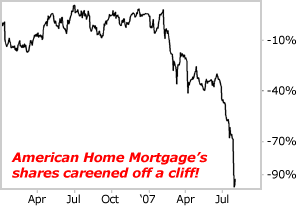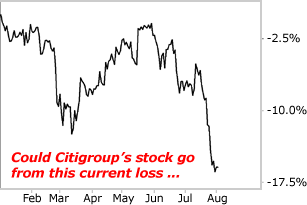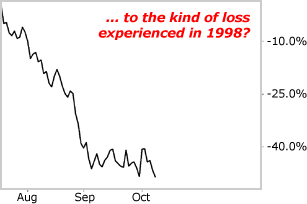Why Financial Stocks Still Look Too Risky ...
Stock-Markets / Financial Crash Aug 03, 2007 - 08:34 AM GMTMike Larson writes: I don't want to pull any punches: This is the worst environment for banks, mortgage lenders, and the general U.S. financial industry that I've seen since 1998!
That's when gun-slinging hedge fund Long Term Capital Management bet billions of dollars in bond markets all over the world.
Everything went swimmingly … until Russia defaulted on its outstanding debts. That spooked global bond investors, prompting massive "flight to quality" buying in U.S. Treasuries. LTCM's bets went haywire and more than $4 billion in losses piled up.
Federal Reserve Chairman Alan Greenspan remarked that he had "never seen anything like this before." The Fed ended up having to step in and organize a bailout to keep the entire market from coming unglued. But before that happened, the credit markets seized up and bank earnings and share prices tanked.
Here's why I think conditions are ripe for a similar result today …
Loan Losses and Liquidity Problems Are Spreading Up the Mortgage Food Chain
In the beginning, Wall Street tried to tell us it was just subprime lenders having problems. But that has been proven false. Indeed, lenders in the Alt-A arena — where loans are made to borrowers that fall between subprime and prime — are now getting killed.
Just look at American Home Mortgage Investment Corp. (AHM) , a mortgage REIT that specialized in making Alt-A loans. Its shares plunged 90% on Tuesday after the company said it was facing substantial margin calls, and that it couldn't fund as much as $800 million in mortgage loans.

American Home Mortgage could tumble into bankruptcy just like New Century Financial, one of the largest subprime lenders, did earlier this year. American Home is no tiny player, either — it made $58.9 billion in loans to almost 200,000 borrowers last year.
Meanwhile, another lender that's active in Alt-A, IndyMac Bancorp (IMB), said second-quarter profits plunged 57%. Its nonperforming assets surged more than four-fold from a year ago to $516 million.
The fallout: Mortgage lenders are rapidly pulling certain products from the market. That includes so-called 2/28 subprime Adjustable Rate Mortgages, which allowed subprime borrowers to get into homes they might otherwise not have been able to afford.
Fewer mortgage choices mean fewer borrowers will qualify for financing, which means fewer homes will get purchased. It's as simple as that.
Compounding the problem is the fact that rates on mortgage bonds have remained largely stable even though rates on U.S. Treasury notes have fallen.
Why? Investors in mortgage securities are demanding higher interest rates out of fear that delinquencies and defaults will keep rising. As a result, borrowers are still facing elevated financing costs even though Treasury yields have declined.
Plus, the Mortgage Problems Have Become Contagious
Not only have the subprime mortgage worries spread to higher-quality parts of the mortgage business, they've spread to other parts of the overall lending. Rates and terms on junk bonds, commercial real estate loans, and leveraged buyout financing have all tightened up.
As the Wall Street Journal reported on August 1:
"In recent weeks, negotiations with banks over refinancings have gone 'from a cordial conversation to something very aggressive,' said Al Koch, vice chairman of AlixPartners, a firm that advises companies that need to restructure. 'Our sense is with the credit markets where they are today, there's not enough money to go around. Companies that either need more money or may need a refinancing may find out that the window is either not open or it's only partially open.'
"'Some companies that are deemed riskier borrowers,' Mr. Koch added, 'won't make the cut, and they'll have no alternative but to file for bankruptcy.'"
As a result, we've seen activity in these markets drop dramatically. Compared to June, the total amount of corporate debt issued in July plunged 66%. The amount of sold junk bonds plummeted by a shocking 89%. And those Collateralized Debt Obligations (CDOs) that used to be so popular? JPMorgan Chase recently said sales of CDOs sank to just $9.1 billion in July from $43 billion in June.
Financial Fallout:
Delinquencies, Loan Losses,
Charge Offs Are All Rising;
Financial Stocks Should Remain Weak
In the first quarter of this year, the FDIC says the percentage of bank loans that were noncurrent — meaning at least 90 days past due or no longer expected to generate interest payments — climbed to 0.83%. That may not sound like much, but it was the highest noncurrent rate in two and a half years.
Separately, a measure of residential real estate loan delinquencies climbed to 2.04% in the first quarter. That was the highest rate in 18 quarters. Net charge-offs on all loans also rose 48.4% from a year ago to $8.1 billion. Mortgage charge-offs led the gains at +93.2%.
And all indicators suggest delinquencies have done nothing but rise even more since these numbers came out! So you can expect loan losses, foreclosures, and charge-offs to rise even further, hurting banks' earnings.
What this means: Banking stocks, and financial stocks in general, will likely remain weak.
Just look at the KBW Bank Index, or BKX . This benchmark measures the performance of the country's largest financial institutions. It closed yesterday at 105.95, down 12.5% from its February high and roughly all the way back to where it was trading in July 2006.
At some point, these stocks will bottom. But I don't think we're there yet. In fact, if this situation is like 1998, major financial stocks could get crushed even more.


Take the mega-bank Citigroup (C) . Its shares are down about 17% from their recent peak, set in the final days of December 2006. That may look like a lot … until you realize that the stock tanked from an intraday peak of $33.92 in July 1998 to an intraday low of $13.25 in October. Total loss: 60.9%!
It's the same story with other financials right now. Wells Fargo (WFC) is down less than 10% from its recent high versus almost 38% in 1998. JPMorgan Chase (JPM) has fallen about 19% this time, compared with 54.5% in 1998.
Bottom line: When financial calamity strikes and credit markets seize up, the companies with big money on the line get hammered!
Could the recent rout be just another "hiccup" like we had earlier in the year? Could all these loan issues sort themselves out, and could we be off to the races again before you know it? Sure. But I darn well wouldn't bet on it! The magnitude of the mortgage-related problems, coupled with the meltdown in other leveraged lending markets, tells me there's more pain to come. So does the history of rough banking markets.
Until next time,
By Mike Larson
This investment news is brought to you by Money and Markets . Money and Markets is a free daily investment newsletter from Martin D. Weiss and Weiss Research analysts offering the latest investing news and financial insights for the stock market, including tips and advice on investing in gold, energy and oil. Dr. Weiss is a leader in the fields of investing, interest rates, financial safety and economic forecasting. To view archives or subscribe, visit http://www.moneyandmarkets.com .
Money and Markets Archive |
© 2005-2022 http://www.MarketOracle.co.uk - The Market Oracle is a FREE Daily Financial Markets Analysis & Forecasting online publication.



